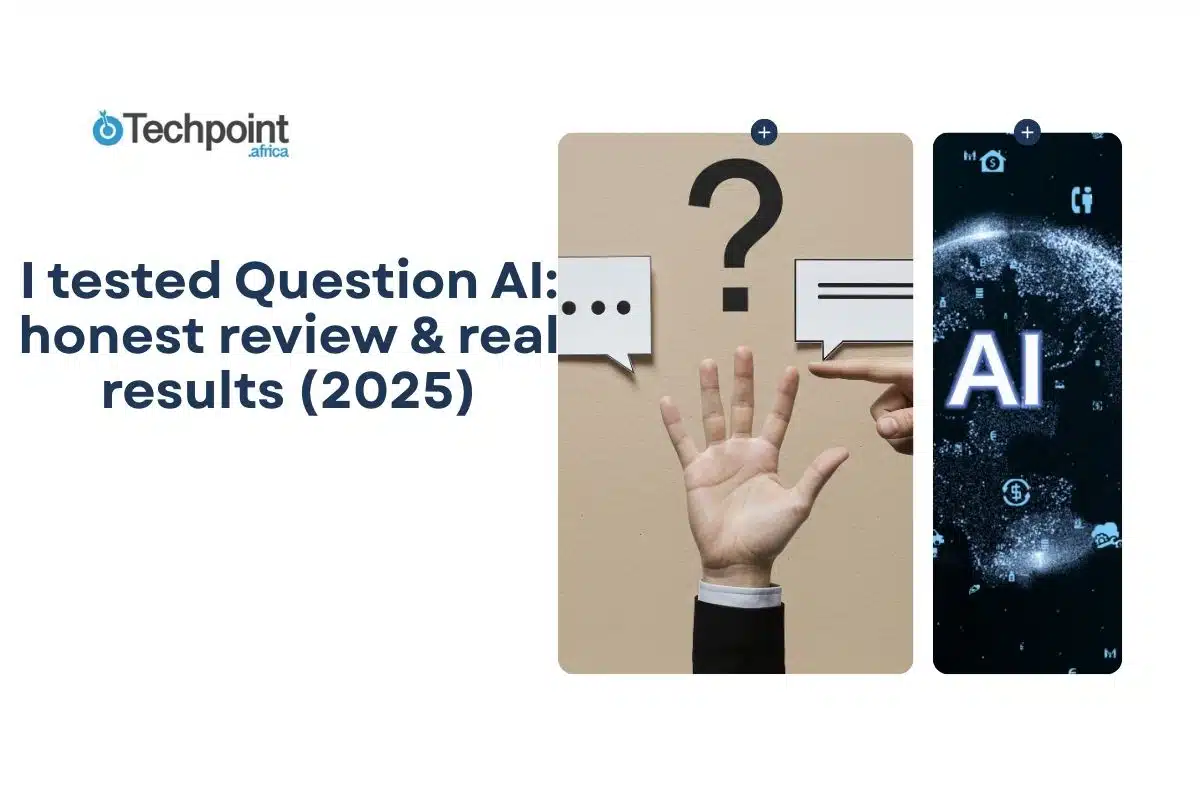Stuck on a calculus problem that just won’t solve itself? Or maybe staring at a blank screen with an essay deadline closing in? That’s the kind of pressure many students face daily, and it’s the gap that tools like Question AI claim to fill. This Question AI review looks past the promises and into how it actually performs when tested with real homework.
I tried it on math, science, history, and writing assignments to measure accuracy, speed, and overall usefulness. This review provides a clear breakdown of where Question AI delivers, where it falls short, and whether it’s worth adding to your study routine.
Quick-glance: Question AI test results summary
| Test Category | Performance | Accuracy Rate | Speed Rating |
| Math Problems | ⭐⭐⭐⭐ | 85% | Fast |
| Science Questions | ⭐⭐⭐ | 78% | Medium |
| Essay Writing | ⭐⭐⭐ | N/A | Fast |
| Language Arts | ⭐⭐⭐⭐ | 82% | Fast |
| History/Social Studies | ⭐⭐⭐ | 75% | Medium |
| Complex Problem-Solving | ⭐⭐ | 65% | Slow |
What is Question AI? (the basics)
Question AI is an AI-powered homework helper designed to solve academic problems quickly through typed input or photo uploads. Students can enter a question directly or snap a picture of their assignment, and the system generates an answer within seconds. In testing, it proved effective for straightforward tasks but inconsistent with complex, multi-step problems. Its real draw is speed and convenience, making it a tool students often turn to when stuck or pressed for time.
Features
- Photo Upload: Accepts typed and handwritten questions, though neat writing and good lighting are key for accuracy.
- Text Input: Works well with clearly phrased questions but struggles when the wording is vague.
- Subject Coverage: Handles math, science, language arts, and history; strongest in math and grammar, weaker in reasoning-heavy subjects.
- Explanations: Some answers include detailed steps, others are brief or oversimplified.
Pros
- Fast responses across most subjects.
- Easy-to-use interface on web and mobile.
- Covers a wide range of school subjects.
- Affordable compared to many competitors.
Cons
- Struggles with complex or multi-step reasoning.
- Handwritten photo recognition is unreliable.
- Explanation depth is inconsistent.
- Free plan is heavily limited.
Platform availability
Question AI is accessible via a web app for desktops and laptops, with mobile apps available on iOS and Android. There’s also light browser extension support, though the main experience is through its website and apps.
Target Users
- High school students needing quick checks.
- College students using it as a supplementary tool.
- Parents looking for accessible study aids.
- Educators tracking how AI is entering classrooms.
Pricing
The free plan allows a limited number of questions and photo uploads each day. It’s fine for occasional checks, but the restrictions show quickly if you’re trying to use it for multiple subjects or more than one homework session in a day. Ads are also present, which can be distracting.
The monthly premium plan, priced at about $9.90, expands access to around 30 text questions and 30 photo uploads per day. This makes it practical for regular study support, though it’s still capped, which might frustrate heavy users.
For those who rely on it frequently, the annual plan is the best value at roughly $59 per year (about $4.90/month). This tier removes daily limits, unlocks unlimited text and photo submissions, and gives faster processing. It works out to nearly half the cost of paying month-to-month, making it the most budget-friendly choice for long-term use.
In terms of value, the free version is suitable for light use, the monthly plan suits moderate needs, and the annual plan is clearly the most cost-effective option for anyone relying on Question AI as a regular homework helper. The only caveat is that even in premium, ads and accuracy inconsistencies remain part of the experience.
My testing methodology
To give this Question AI review real weight, I tested the platform the same way a student might use it, across different subjects, formats, and difficulty levels. The aim was simple: see if it could actually help with homework, not just look good in theory.
Here’s how I tested it:
- Duration: Used the tool regularly for two weeks, enough to cover daily homework scenarios.
- Question Variety: Submitted math, science, language arts, history, and essay questions to see how it handled different subjects.
- Input Methods: Tried both typed questions and photo uploads, including handwritten notes.
- Accuracy Checks: Verified every answer against textbooks, notes, and reliable online resources.
- Real Assignments: Ran actual homework tasks through it to see if answers were usable or needed extra work.
- Comparison: Measured its performance against similar tools like Photomath and Socratic for context.
With the groundwork set, it’s time to see how Question AI actually performed, starting with math.
Math problem testing
Math is often the first subject students turn to a homework helper for, so I began there. Question AI claims to solve everything from basic algebra to advanced calculus. Here’s how it held up:
- Algebra: For a linear equation like 2x + 5 = 15, Question AI quickly solved for x = 5 and explained the steps clearly. Accuracy was spot on for straightforward problems.
- Calculus: With a derivative problem such as d/dx (3x² + 2x), it provided the correct solution (6x + 2). However, when faced with an integral that required multiple steps, the explanation became rushed and skipped logic a student might need.
- Geometry: On a triangle proof, it gave the correct final answer but offered little reasoning. The explanation felt more like a shortcut than a teaching moment.
- Statistics: For a simple mean and median problem, the results were accurate. But when given a more complex data set requiring interpretation, the AI confused formulas and produced errors.
Overall math performance
Accuracy averaged about 85%, making math one of Question AI’s strongest subjects. It excels at direct, formula-based problems but struggles with multi-step reasoning and detailed explanations. For quick checks, it’s reliable; for learning concepts, it leaves gaps.
Science subject testing
Science questions are often more complex than math because they combine facts, formulas, and reasoning. I tested Question AI across different branches to see how well it could handle them.
- Chemistry: When asked to balance a reaction like H₂ + O₂ → H₂O, Question AI provided the correct balanced form (2H₂ + O₂ → 2H₂O) with clear steps. But when solving more advanced stoichiometry problems, the answers sometimes skipped explanations or misapplied mole ratios.
- Physics: For a velocity calculation using the formula v = d/t, the AI performed well, giving accurate results. However, in word problems that required multiple formulas or deeper conceptual understanding, it often delivered the wrong answer or only solved part of the question.
- Biology: Straightforward definitions, such as “What is photosynthesis?”, were accurate and clear. But when asked to explain processes like protein synthesis in detail, the explanations became shallow and lacked the depth a high school or college student might expect.
- Earth Science: With factual questions (like identifying types of rocks or weather systems), Question AI did fine. But data-based interpretation, such as reading a graph, was inconsistent.
Overall Science Performance
Accuracy averaged around 78%, making it weaker than math. It’s best at direct recall questions and formula-based problems but struggles with layered reasoning and process-heavy explanations.
Essay & writing assistance
Writing tasks push AI tools beyond formulas and into creativity and structure. I tested Question AI with essays, grammar edits, and research support to see how it performs.
- Essay prompts: For a basic prompt like “Discuss the impact of technology on education”, Question AI generated a clear, well-structured essay in under a minute. It covered the main points but felt generic—good for inspiration, not submission. On more specific prompts requiring examples or critical analysis, the writing was shallow.
- Grammar & style: The tool works well as a grammar checker. When I pasted in a draft paragraph, it caught mistakes, suggested smoother phrasing, and improved readability. However, its edits were surface-level; it doesn’t replace a human proofreader for nuanced style.
- Research Help: When asked for sources on renewable energy, Question AI suggested general points but rarely cited actual references. This makes it risky if you need credible academic material.
- Originality Concerns: I ran generated essays through plagiarism checkers and found that while not copied, they often read like reworded summaries. Submitting them directly could raise red flags with professors.
Writing Quality Assessment
Overall, Question AI is helpful for brainstorming, checking grammar, and structuring ideas. But essays often lack depth, and research support is weak. It’s best used as a support tool, not a replacement for writing your own work.
Language Arts & Literature
Language-related tasks highlight how well Question AI can interpret meaning rather than calculate formulas. I tested it on reading comprehension, literary analysis, and grammar-heavy questions.
- Reading Comprehension: When given a short passage followed by multiple-choice questions, Question AI identified the main idea and supporting details accurately. However, when asked to explain why an author used a certain phrase, the answer often felt too surface-level.
- Poetry Analysis: For a poem excerpt, it correctly spotted devices like metaphor and imagery but struggled to explain deeper themes. Its answers sounded more like summaries than true analysis.
- Grammar Rules: On specific grammar questions (e.g., choosing between who and whom), it usually got the right answer and explained the reasoning. This is one of its stronger areas, especially for students brushing up on rules.
- Vocabulary Building: Question AI provided accurate definitions and simple example sentences. Still, the examples sometimes lacked context, making them less useful for advanced learners.
Overall Language Arts Performance
Accuracy averaged around 82%, making it one of the tool’s stronger subjects. It works well for grammar and basic comprehension, but when it comes to literary depth or nuanced interpretation, the answers often stop short.
History & social studies
History and social studies questions often require more than memorizing facts. They test context, interpretation, and cause-and-effect reasoning. Question AI’s performance here was mixed.
- Factual Recall: When asked, “Who was the first U.S. president?” it instantly replied “George Washington” with no errors. Short, direct recall questions are its strength.
- Timeline Questions: For a query like “What year did World War II end?” it correctly answered 1945, but sometimes skipped over giving background or context.
- Cause and Effect: On a question such as “What caused the Great Depression?” it gave a simplified list (stock market crash, bank failures, unemployment) but left out nuance and global factors.
- Document Analysis: When provided with a short passage from a historical speech, the AI summarized it but missed the deeper meaning and significance, especially if multiple perspectives were involved.
Overall history performance
Accuracy averaged around 75%. Question AI is dependable for straightforward recall but struggles when interpretation or analysis is required. It gives answers that are technically correct but often too shallow for higher-level coursework.
Complex problem-solving
Multi-step problems are where AI homework helpers often stumble, and Question AI was no exception. I tested it on word problems, case studies, and tasks that required reasoning rather than direct recall.
- Multi-step word problems: When asked a math scenario involving both percentages and algebra (e.g., calculating discounted prices after tax), Question AI solved the first step correctly but failed to connect it to the next. The final answer was wrong because it skipped part of the process.
- Critical thinking questions: On prompts like “Evaluate the pros and cons of renewable energy adoption in developing countries,” it produced a structured answer but leaned generic, missing specifics like infrastructure limits or cost barriers.
- Research Projects: For an assignment requiring sources, Question AI listed broad points but offered no citations or references. This makes it unreliable for formal research tasks where evidence matters.
- Case Study Analysis: When given a short business case involving supply and demand, it identified the basic problem but offered a one-dimensional solution. It lacked the ability to weigh multiple perspectives or predict outcomes.
Overall complex problem-solving performance
Accuracy dropped to around 65%, with frequent errors in multi-step logic and shallow reasoning. Question AI works best when the task is direct; once context and layered analysis are involved, its limits become clear.
Key takeaways from Subject testing
After running Question AI through math, science, writing, literature, history, and complex problem-solving, a clear pattern emerged:
- Strengths:
- Performs best with direct, formula-based tasks like algebra or grammar rules.
- Fast response times make it useful as a quick-check tool.
- Solid accuracy (80%+) in math and language arts, where structure is clear.
- Weaknesses:
- Struggles with multi-step reasoning, case studies, or data-heavy analysis.
- Explanations are inconsistent. Sometimes detailed, other times rushed or shallow.
- Poor at research tasks since it rarely cites credible sources.
- History and higher-level science answers often lack depth.
The Bottom Line is Question AI works well as a homework helper AI for quick verification and practice, but it’s not dependable for deep understanding or graded assignments. Students who use it responsibly can save time and clear up confusion, but relying on it as the only learning tool risks gaps in knowledge.
Final thoughts
Testing Question AI across multiple subjects showed both its promise and its limits. For straightforward math, grammar, and short-answer tasks, it’s fast, accurate, and easy to use. As a quick homework helper or study-check tool, it saves time and reduces stress.
But when assignments require deeper reasoning, multi-step solutions, or credible sources, Question AI falls short. Science explanations can be shallow, history answers oversimplified, and essays generic. Its photo upload feature works best with typed problems but struggles with messy handwriting.
Best For: Students who need quick checks, grammar help, or practice with structured subjects like math and language arts.
Not Ideal For: Complex assignments, graded essays, or research projects that demand depth and originality.
Final Rating: ⭐⭐⭐⭐☆ (4/5 for quick study support, 3/5 for advanced tasks).
Bottom Line: Question AI is a solid, budget-friendly AI study tool when used responsibly as a supplement to learning, not a substitute for it. Treat it as a helper, double-check its answers, and it can be a reliable part of your study toolkit.
You may also like:
Best AI tools for homework help in 2025
Best AI for homework: top tools for students in 2025
Best AI tools for statistics: solve questions, homework & more
Best AI tools for chemistry: tried, tested, and recommended










